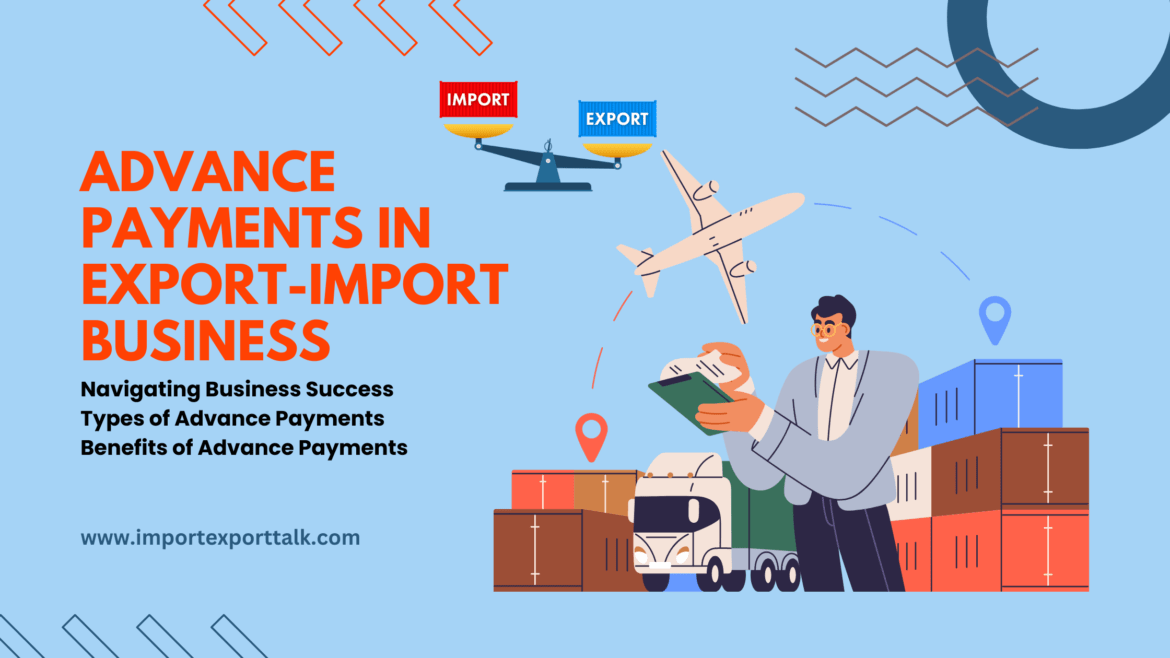Advance payments in export-import business play a pivotal role in facilitating smooth and secure transactions between exporters and importers. The concept of advance payments involves upfront financial transactions before the goods are shipped or received. The significance of advance payments in export-import business, their benefits, challenges, and strategies to navigate this essential aspect of global trade.
Understanding Advance Payments in Export-Import Business
1. What are Advance Payments?
Advance payments, also known as prepayments or upfront payments, refer to funds transferred from the buyer to the seller before the goods are shipped or delivered. This financial arrangement is a common practice in export-import business to secure the interests of both parties involved.
2. Types of Advance Payments
There are three primary types of advance payments in international trade:
a. Advance Payment (Full Prepayment):
In this scenario, the buyer pays the entire invoice amount upfront before the goods are shipped. The seller has full payment assurance before fulfilling the order.
b. Partial Advance Payment:
Here, a portion of the total invoice amount is paid in advance, while the remaining balance is settled upon shipment or delivery.
c. Retainer or Mobilization Payment:
This type of advance payment is common in larger projects or contracts. A percentage of the total contract value is paid upfront to initiate the project, with subsequent payments tied to project milestones.
Benefits of Advance Payments
1. Risk Mitigation:
Advance payments provide a level of security for the seller, ensuring they receive funds before dispatching the goods. This minimizes the risk of non-payment or default.
2. Working Capital:
For exporters, advance payments inject immediate working capital into their operations. This financial boost enables them to manage production, procure raw materials, and fulfill other business commitments.
3. Buyer Commitment:
Advance payments demonstrate the buyer’s commitment to the transaction. It shows their intention to proceed with the purchase, fostering trust and transparency in the business relationship.
4. Cash Flow Control:
Importers can strategically manage their cash flow by negotiating advance payment terms with suppliers. This allows them to plan their payments and allocate funds accordingly.
Challenges and Risk of Advance Payments
1. Supplier Reliability:
Buyers may be concerned about making advance payments to unfamiliar suppliers. Thorough due diligence, background checks, and verification can mitigate this risk.
2. Quality and Compliance:
Sellers need to ensure that the goods meet the agreed-upon quality and specifications. Inspection, quality control, and clear contractual terms are essential to avoid disputes.
3. Legal and Regulatory Considerations:
Both parties must be aware of legal and regulatory requirements in their respective countries. Contracts should clearly outline payment terms, delivery schedules, and dispute resolution mechanisms.
Navigating Advance Payments for Success
1. Clear Contracts:
Draft comprehensive contracts that outline payment terms, delivery schedules, quality standards, and dispute resolution procedures. Legal expertise can ensure contracts align with international trade regulations.
2. Due Diligence:
Conduct thorough due diligence on business partners before engaging in advance payment transactions. Verify credentials, references, and financial stability to mitigate risks.
3. Payment Instruments:
Utilize secure and internationally recognized payment methods, such as letters of credit (LCs) or escrow services, to safeguard advance payments.
4. Communication and Transparency:
Maintain open lines of communication between buyers and sellers. Transparency regarding order progress, shipment updates, and potential delays fosters trust and collaboration.
5. Insurance Coverage:
Consider trade credit insurance to protect against non-payment risks. This coverage can provide financial protection in case of buyer default.
Advance payments are a fundamental aspect of export-import business that contribute to secure transactions, cash flow management, and risk mitigation. By understanding the types of advance payments, their benefits, challenges, and implementing effective risk mitigation strategies, businesses can navigate the complex landscape of international trade successfully.
Clear contracts, due diligence, secure payment instruments, transparent communication, and insurance coverage are key components of a robust approach to advance payments. With these strategies in place, exporters and importers can forge mutually beneficial relationships, drive business growth, and navigate the path to global trade success.


2 comments
[…] Advance payments in export-import business […]
an advance payment from the buyer before shipment reduces credit risk. However, this approach might be less favorable